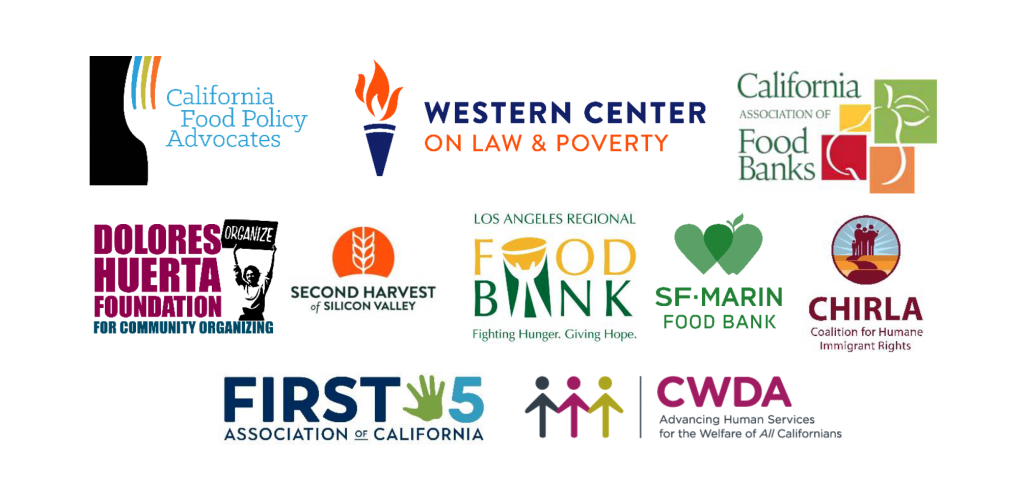Response to Signing of H. R. 8337 Continuing Resolution
September 30, 2020
We do not offer food. Here’s where you can find food.
No distribuimos alimentos. Encuentre comida gratis aquí.
我們不直接提供食物,但我們能幫助您找尋食物。

Today, the President was presented Continuing Resolution (H.R. 8337) after it was passed out of the U.S. House of Representatives and the U.S. Senate and it is pending his signature. H.R. 8337 will deliver much needed nutrition assistance to millions of California students and their families. We applaud House Speaker Nancy Pelosi for her leadership, and for securing bipartisan support to extend and expand Pandemic EBT and other key nutrition programs included in the bill. Below is a summary of the bill’s highlights with respect to preventing hunger.
While the continuing resolution offers significant help to Californians who are struggling to meet their basic needs in the wake of COVID-19, without additional relief, hunger and economic hardship will continue to rise. Notably, the bill did not include a boost in benefits to the nation’s largest and most effective anti-hunger program, the Supplemental Nutrition Assistance Program, known as CalFresh in California. To prevent additional hunger and harm, we demand that Congress begin work immediately to correct this misstep and resume negotiations on the next COVID relief package.
Congress must take additional action to mitigate the racial and economic disparities in food access that have been exposed and exacerbated by the pandemic. According to a report issued this week by the California Budget and Policy Center, more than 20% of Black and Latinx households with children are struggling to afford enough food in California, compared to about 9% of white households. Many of these same Californians are immigrants and essential workers who, in a cruel twist, are at greater risk of COVID-19, because they are on the front lines of the pandemic, risking their lives and health by growing, picking, packing and selling the food that the rest of the country relies on. In the absence of additional congressional action, state leaders must also act to prevent these longstanding disparities from worsening.
SNAP/CalFresh: Clean extension of existing SNAP/CalFresh workload flexibilities, including extending certification periods, adjusting periodic reports, and adjusting interview requirements through June 2021. Allows states to use simplified reporting procedures for recertification’s through December 2021. Provides relief in state’s SNAP/CalFresh quality control (QC) system through September 2021.
Pandemic-EBT: H.R. 8337 extends and makes important changes to improve Pandemic EBT. (P-EBT) is a new program from the Families First Act that helps families buy food for their children during COVID-19 related school closures. P-EBT provides families with a food benefit on an Electronic Benefit Transfer (EBT) card to purchase food and groceries. P-EBT was set to expire on September 30, 2020, but H.R. 8337 extended the program to September 30, 2021. H.R. 8337 also expanded the program, beginning October 1, 2020 to serve young children who are enrolled in SNAP and child care facilities that have closed or reduced their attendance or hours for at least five consecutive days. H.R. 8337 also offers state administrative funding and important new flexibilities to facilitate P-EBT administration. These flexibilities include allowing states to adapt P-EBT for schools operating “hybrid” models in which schools are still open, but have reduced the number of days or hours that students are in attendance. The resolution applies these changes to P-EBT state plans for August and September and allows states to finalize their spring issuances without the September 30th deadline to issue benefits. Finally, H.R. 8337 ends the exclusion of P-EBT for Puerto Ricans.
Women, Infant and Children: H.R. 8337 extends WIC administrative waivers through September 30, 2021, including waiving the requirement for in-person WIC clinic visits.
School Meal Programs: H.R. 8337 extends USDA’s authority to grant child nutrition waivers in order to ensure efficient grab-and-go meal service at schools that are not open or partially open and to provide more flexibility to school and summer meal providers to maximize their ability to prevent child hunger through September 30, 2021. We reiterate our call on Secretary Purdue to utilize this authority and immediately extend these waivers through the 2020-21 school year, and to September 30, 2021 if conditions warrant.
Finally, we are grateful to our national anti-hunger partners. Their statements on the passage of the Senate Farm and Nutrition Act – H.R. 8337 can be found here: